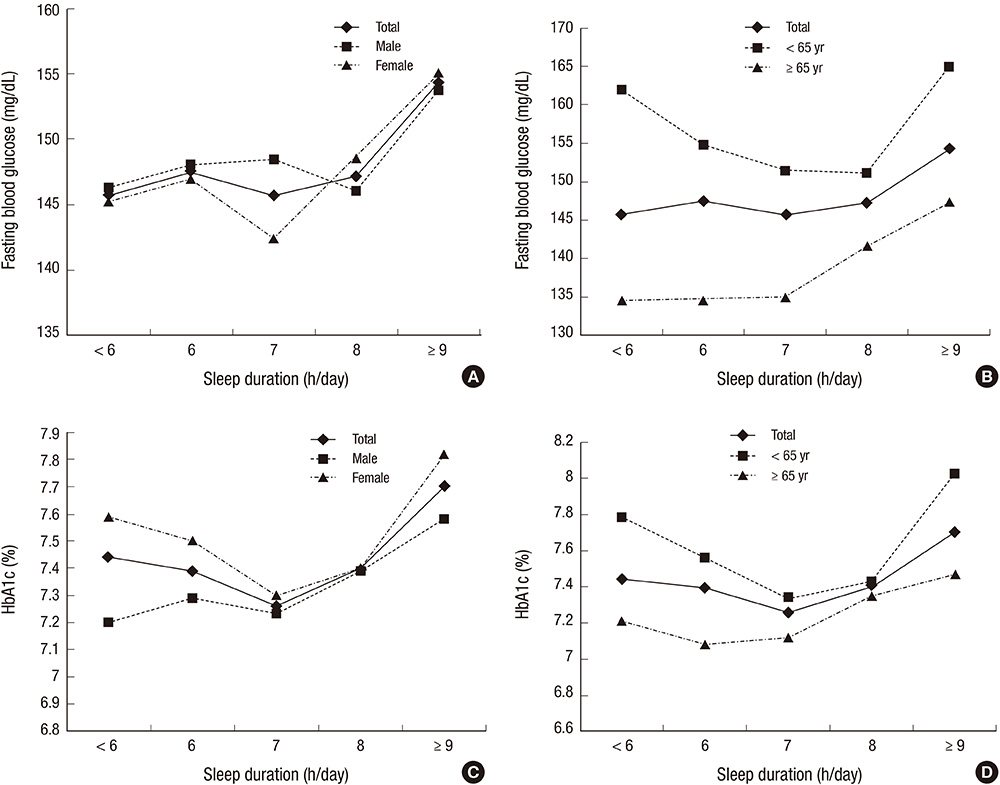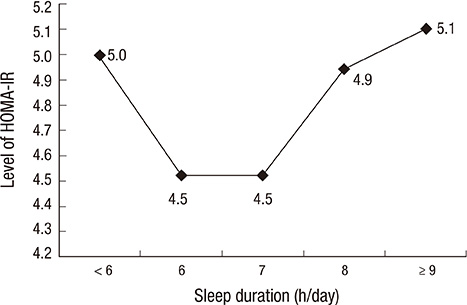Sleep Duration and Glycemic Control in Patients with Diabetes Mellitus: Korea National Health and Nutrition Examination Survey 2007-2010
- Affiliations
-
- 1Department of Internal Medicine, Kosin University College of Medicine, Busan, Korea.
- 2Department of Endocrinology and Metabolism, Ajou University School of Medicine, Suwon, Korea. djkim@ajou.ac.kr
- 3Institute on Aging, Ajou University School of Medicine, Suwon, Korea.
- KMID: 1793049
- DOI: http://doi.org/10.3346/jkms.2013.28.9.1334
Abstract
- Short sleep duration has been reported to increase the risk of diabetes. However, the influence of sleep duration on glycemic control in diabetic patients has not been clarified. In this study we evaluated the association between sleep duration and glycemic control in diabetic patients. We analyzed the data from the Korea National Health and Nutrition Examination Survey (KNHANES) 2007-2010. Sleep duration was classified into five groups: <6, 6, 7, 8, and > or =9 h/day. Fasting blood glucose and HbA1c showed a U-shaped trend according to sleep duration. Sleep duration of 7 h/day had the lowest HbA1c (7.26%) among the subjects (P=0.026). In the older age group (> or =65 yr), a sleep duration of 6 h/day was associated with the lowest HbA1c (7.26%). The adjusted odds ratio (OR) with a 95% confidence interval (CI) of worse glycemic control (HbA1c > or =7.0%) in group of sleep duration of > or =9 h/day was 1.48 (1.04-2.13) compared with the group of 7 h/day. This relationship disappeared after adjusting duration of diabetes (OR, 1.38; 95% CI, 0.93-2.03). Our results suggest that sleep duration and glycemic control in diabetic patients has U-shaped relationship which was mainly affected by duration of diabetes.
Keyword
MeSH Terms
-
Age Factors
Aged
Asian Continental Ancestry Group
Blood Glucose/*analysis
Diabetes Mellitus, Type 2/*diagnosis/metabolism
Female
Hemoglobin A, Glycosylated/*analysis
Humans
Insulin Resistance
Male
Middle Aged
Nutrition Surveys
Odds Ratio
Republic of Korea
Risk Factors
Sleep/*physiology
Blood Glucose
Hemoglobin A, Glycosylated
Figure
Cited by 3 articles
-
Association of Sleep Duration and Obesity According to Gender and Age in Korean Adults: Results from the Korea National Health and Nutrition Examination Survey 2007–2015
Keun-Hyok Cho, Eun-Hee Cho, Junguk Hur, Dayeon Shin
J Korean Med Sci. 2018;33(53):. doi: 10.3346/jkms.2018.33.e345.Protective Effects of Melatonin in High-Fat Diet-Induced Hepatic Steatosis via Decreased Intestinal Lipid Absorption and Hepatic Cholesterol Synthesis
Hyungjune Ku, Yeonji Kim, Alvin Lyle Kim, Garam Lee, Youngsik Choi, Bukyung Kim
Endocrinol Metab. 2023;38(5):557-567. doi: 10.3803/EnM.2023.1672.Effectiveness of a Social Networking Site Based Automatic Mobile Message Providing System on Glycemic Control in Patients with Type 2 Diabetes Mellitus
Kyuho Kim, Jae-Seung Yun, Joonyub Lee, Yeoree Yang, Minhan Lee, Yu-Bae Ahn, Jae Hyoung Cho, Seung-Hyun Ko
Endocrinol Metab. 2024;39(2):344-352. doi: 10.3803/EnM.2023.1871.
Reference
-
1. Lam DW, LeRoith D. The worldwide diabetes epidemic. Curr Opin Endocrinol Diabetes Obes. 2012; 19:93–96.2. Kim DJ. The epidemiology of diabetes in Korea. Diabetes Metab J. 2011; 35:303–308.3. Kim JH, Kim DJ, Jang HC, Choi SH. Epidemiology of micro- and macrovascular complications of type 2 diabetes in Korea. Diabetes Metab J. 2011; 35:571–577.4. Haffner SM. Coronary heart disease in patients with diabetes. N Engl J Med. 2000; 342:1040–1042.5. Gottlieb DJ, Punjabi NM, Newman AB, Resnick HE, Redline S, Baldwin CM, Nieto FJ. Association of sleep time with diabetes mellitus and impaired glucose tolerance. Arch Intern Med. 2005; 165:863–867.6. Ko GT, Chan JC, Chan AW, Wong PT, Hui SS, Tong SD, Ng SM, Chow F, Chan CL. Association between sleeping hours, working hours and obesity in Hong Kong Chinese: the 'better health for better Hong Kong' health promotion campaign. Int J Obes (Lond). 2007; 31:254–260.7. Park SE, Kim HM, Kim DH, Kim J, Cha BS, Kim DJ. The association between sleep duration and general and abdominal obesity in Koreans: data from the Korean National Health and Nutrition Examination Survey, 2001 and 2005. Obesity (Silver Spring). 2009; 17:767–771.8. Ayas NT, White DP, Al-Delaimy WK, Manson JE, Stampfer MJ, Speizer FE, Patel S, Hu FB. A prospective study of self-reported sleep duration and incident diabetes in women. Diabetes Care. 2003; 26:380–384.9. Gangwisch JE, Heymsfield SB, Boden-Albala B, Buijs RM, Kreier F, Pickering TG, Rundle AG, Zammit GK, Malaspina D. Sleep duration as a risk factor for diabetes incidence in a large U.S. sample. Sleep. 2007; 30:1667–1673.10. Ohkuma T, Fujii H, Iwase M, Kikuchi Y, Ogata S, Idewaki Y, Ide H, Doi Y, Hirakawa Y, Nakamura U, et al. Impact of sleep duration on obesity and the glycemic level in patients with type 2 diabetes: the Fukuoka Diabetes Registry. Diabetes Care. 2013; 36:611–617.11. Trento M, Broglio F, Riganti F, Basile M, Borgo E, Kucich C, Passera P, Tibaldi P, Tomelini M, Cavallo F, et al. Sleep abnormalities in type 2 diabetes may be associated with glycemic control. Acta Diabetol. 2008; 45:225–229.12. Matthews DR, Hosker JP, Rudenski AS, Naylor BA, Treacher DF, Turner RC. Homeostasis model assessment: insulin resistance and beta-cell function from fasting plasma glucose and insulin concentrations in man. Diabetologia. 1985; 28:412–419.13. Koren D, Levitt Katz LE, Brar PC, Gallagher PR, Berkowitz RI, Brooks LJ. Sleep architecture and glucose and insulin homeostasis in obese adolescents. Diabetes Care. 2011; 34:2442–2447.14. Choi KM, Lee JS, Park HS, Baik SH, Choi DS, Kim SM. Relationship between sleep duration and the metabolic syndrome: Korean National Health and Nutrition Survey 2001. Int J Obes (Lond). 2008; 32:1091–1097.15. Chao CY, Wu JS, Yang YC, Shih CC, Wang RH, Lu FH, Chang CJ. Sleep duration is a potential risk factor for newly diagnosed type 2 diabetes mellitus. Metabolism. 2011; 60:799–804.16. Yaggi HK, Araujo AB, McKinlay JB. Sleep duration as a risk factor for the development of type 2 diabetes. Diabetes Care. 2006; 29:657–661.17. Cappuccio FP, D'Elia L, Strazzullo P, Miller MA. Sleep duration and all-cause mortality: a systematic review and meta-analysis of prospective studies. Sleep. 2010; 33:585–592.18. Javaheri S, Storfer-Isser A, Rosen CL, Redline S. Association of short and long sleep durations with insulin sensitivity in adolescents. J Pediatr. 2011; 158:617–623.19. Tahrani AA, Ali A, Raymond NT, Begum S, Dubb K, Mughal S, Jose B, Piya MK, Barnett AH, Stevens MJ. Obstructive sleep apnea and diabetic neuropathy: a novel association in patients with type 2 diabetes. Am J Respir Crit Care Med. 2012; 186:434–441.20. Song Y, Ye X, Ye L, Li B, Wang L, Hua Y. Disturbed subjective sleep in Chinese females with type 2 diabetes on insulin therapy. PLoS One. 2013; 8:e54951.21. Russell IJ, Crofford LJ, Leon T, Cappelleri JC, Bushmakin AG, Whalen E, Barrett JA, Sadosky A. The effects of pregabalin on sleep disturbance symptoms among individuals with fibromyalgia syndrome. Sleep Med. 2009; 10:604–610.22. Knutson KL, Van Cauter E. Associations between sleep loss and increased risk of obesity and diabetes. Ann N Y Acad Sci. 2008; 1129:287–304.23. Knutson KL, Spiegel K, Penev P, Van Cauter E. The metabolic consequences of sleep deprivation. Sleep Med Rev. 2007; 11:163–178.24. Bliwise DL, Young TB. The parable of parabola: what the U-shaped curve can and cannot tell us about sleep. Sleep. 2007; 30:1614–1615.25. Patel SR, Malhotra A, Gottlieb DJ, White DP, Hu FB. Correlates of long sleep duration. Sleep. 2006; 29:881–889.26. Stranges S, Dorn JM, Shipley MJ, Kandala NB, Trevisan M, Miller MA, Donahue RP, Hovey KM, Ferrie JE, Marmot MG, et al. Correlates of short and long sleep duration: a cross-cultural comparison between the United Kingdom and the United States: the Whitehall II Study and the Western New York Health Study. Am J Epidemiol. 2008; 168:1353–1364.27. Pradhan AD, Manson JE, Rifai N, Buring JE, Ridker PM. C-reactive protein, interleukin 6, and risk of developing type 2 diabetes mellitus. JAMA. 2001; 286:327–334.28. Boyle PJ, Scott JC, Krentz AJ, Nagy RJ, Comstock E, Hoffman C. Diminished brain glucose metabolism is a significant determinant for falling rates of systemic glucose utilization during sleep in normal humans. J Clin Invest. 1994; 93:529–535.29. De la Eva RC, Baur LA, Donaghue KC, Waters KA. Metabolic correlates with obstructive sleep apnea in obese subjects. J Pediatr. 2002; 140:654–659.30. Zuo H, Shi Z, Yuan B, Dai Y, Hu G, Wu G, Hussain A. Interaction between physical activity and sleep duration in relation to insulin resistance among non-diabetic Chinese adults. BMC Public Health. 2012; 12:247.
- Full Text Links
- Actions
-
Cited
- CITED
-
- Close
- Share
- Similar articles
-
- Factors Associated with Poor Glycemic Control among Patients with Type 2 Diabetes Mellitus: The Fifth Korea National Health and Nutrition Examination Survey (2010-2012)
- Diabetes-related Characteristics in Men with Diabetes for the Glucose Control Group and Noncontrol Group
- Intake of Fruit and Glycemic Control in Korean Patients with Diabetes Mellitus Using the Korea National Health and Nutrition Examination Survey
- Identification of Subgroups with Poor Glycemic Control among Patients with Type 2 Diabetes Mellitus: Based on the Korean National Health and Nutrition Examination Survey from KNHANES VII (2016 to 2018)
- Associations between grip strength and glycemic control in type 2 diabetes mellitus: an analysis of data from the 2014-2019 Korea National Health and Nutrition Examination Survey



